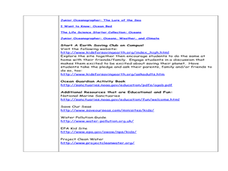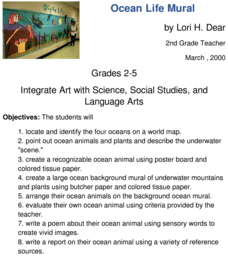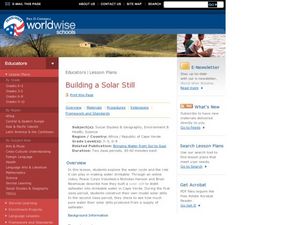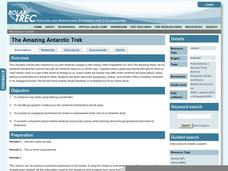Curated OER
Marine Animal and Plant Adaptations
Students examine nature by creating their own animals. In this animal adaptation instructional activity, students define scientific vocabulary terms dealing with adaptation such as sea stars, sea cucumbers and exoskeleton. Students...
Curated OER
Too Hot? Gotta Vent!
Students study deep sea exploration and underwater geology, specifically hydrothermal sea vents. They create digital video projects of their own to demonstrate their knowledge, illustrating the discoveries of the explorers of the ocean's...
Curated OER
Exploring Explorations
Students describe human benefits from ocean exploration. In this ocean exploration lesson, students focus on the historical, biological, and physical features of the deep oceans and man's exploration.
Curated OER
I Can Preserve My Planet
Students explore renewable and nonrenewable resources. In this ocean preservation lesson, students use KWL charts to understand ways the ocean is important to our daily lives. Students create a poster or wirte a letter to someone...
NOAA
I Can't Breathe!
The Gulf of Mexico dead zone, an area of low oxygen that kills marine life, costs the United States $82 million every year. Young scientists research anoxic ocean environments then come up with a hypothesis for the cause of the Gulf of...
Curated OER
Oceans: True or False?
Students take a true or false quiz to test their knowledge of oceans and ocean life, and research various Internet websites to locate the answers to the quiz questions.
Curated OER
Lesson Six
Students investigate the importance of ocean resources and what humans need to do to maintain a healthy ocean. In this oceans lesson students participate in an activity after viewing a PowerPoint presentation on the Earth's...
Curated OER
Weather and Oceans: Uneven Heating of the Earth
Students investigate what causes the heat on Earth. In this Earth heating lesson, students experiment with different heat sources and determine where the Earth gathers the most heat. Students explore vocabulary words...
Curated OER
Blue Planet: Seas of Life
Students study coral reefs and marine communities. In this investigative lesson plan students get into groups and are assigned a subject. In their groups they create a poster about their assigned topic.
Curated OER
Exploring the National Marine Sanctuaries: A Lesson in Habitats and Human Impacts
Students examine the marine sanctuaries in the Pacific and Atlantic Oceans. They discover the interdependence of all living things and work together in groups to create a poster about what they have discovered during the lesson. They...
Curated OER
Seas Of Life
Young scholars brainstorm examples of predator and prey that are featured in a video they watch. For this investigative lesson students will research an animal from the video and explain if it is a predator or prey and how it helps...
Curated OER
Hypothermia on the High Seas
Students identify and present the effects on humans when the body temperature falls, demonstrate and explain how the body loses heat, and understand hypothermia and cold water survival techniques.
Curated OER
Miller-Urey Experiment Amino Acids & The Origins of Life on Earth
Students study the Miller-Urey Experiment including its history and criticism. In this origins of life lesson students repeat this experiment to see how it works.
Curated OER
A Long Way from Home: A Hands-on Geography Lesson about World War II
Students build World War II directional signs. In this World War II lesson, students explore the geographic locations of the war as they analyze primary sources and conduct research regarding places of significance in the war. Students...
Curated OER
Lesson Plan on Latitude and Longitude
Sixth graders identify at least ten places on the world map using given longitude and latitude points. They identify the longitude and latitude of ten places on the world map.
Curated OER
Day Eight Lesson- The Whale Rider
Students examine cultural differences through the reading of The Whale Rider by Witi Ihimaera. In this language arts lesson, students work in groups to analyze chapters 11 and 12 of the novel; these chapters highlight...
Curated OER
Interpreting Oceans of Data
Sixth graders analyze the data from a scientific experiment. In this statistics lesson, 6th graders answer questions about some data to show their understanding of the data. They apply the result to future decisions when using data.
Curated OER
Lights On ! Lights Off! Exploring Human Settlement Patterns
Third graders write informational paragraphs based on the settlement patterns of the United States. In this settlement lesson plan, 3rd graders read about population and how it affects where people settle next.
Curated OER
Should We Hunt the Largest Animals on the Planet?
Young scholars discover details about whaling. In this environmental stewardship lesson, students research selected websites to locate information about commercial whaling and its implications.
Curated OER
Come on In- the Water's Fine
Students examine how coastal erosion effects seaside communities. They investigate how people have to make choices when manipulate the physical environment such as when dredging and constructing seawalls in coastal areas. They complete a...
Curated OER
Oily Oceans
Students, after reading Jack, the Seal and the Sea, by Gerald Aschenbrenner, get a hands-on knowledge of the effects of oil on water, and those things that come in contact with it.
Curated OER
Ocean Life Mural
How many oceans can you name? First, have learners try to name as many oceans as they can, and then have them locate and identify the oceans on a world map. They create a recognizable ocean animal using poster board and tissue paper....
Curated OER
Building A Solar Still
Students investigate the water cycle by viewing an online video. In this drinking water lesson, students create solar stills at their campus in order to purify water that is tainted. Students view a video on their computers...
Polar Trec
The Amazing Antarctic Trek
This resource provides two ways to engage learners in using latitude, longitude, and research skills. In pairs, or on their own, learners will locate several Antarctic regions on a map. They will write the name of the place and a few key...
Other popular searches
- Math Lessons on Oceans
- Pre K Lessons on Oceans
- Prue K Lessons on Oceans
- Drama Lessons on Oceans
- Pr K Lessons on Oceans























